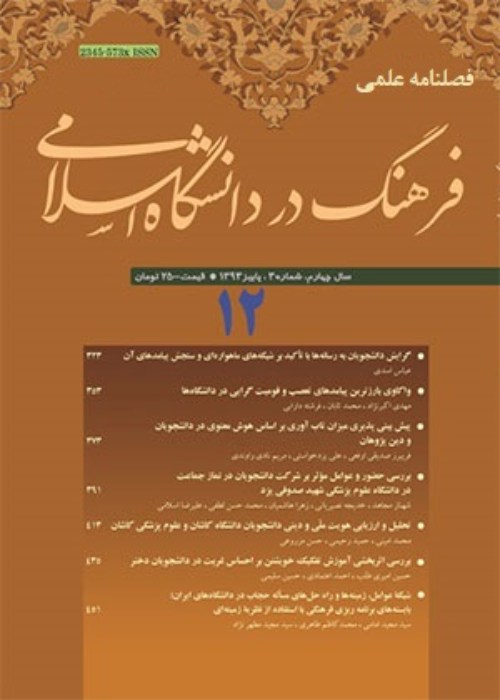Relationship between Perfectionism and Anxiety and Emotional Cognitive Regulation with Students' Academic Engagement in Payame Noor University of Piranshahr
The subject of the present research is investigating the relationship between perfectionism and anxiety and emotional cognitive regulation with students' academic engagement in Payame Noor University of Piranshahr.
The present study is a descriptive-correlational study, and the statistical population included all students studying at Payame Noor University of Piranshahr in the 97-96 years. 219 students were selected from the statistical community through available sampling. The participants responded to Schoofilli, Litter, Maslach, and Jackson’s academic engagement (1996), Hill and colleagues’ perfectionism (2004), the emotional cognitive regulation questionnaire by Gazenfsky, Kraiyev and Spinhaven(2001) and Beck’s Anxiety questionnaire (1990). The data was analyzed by SPSS software 24 using Pearson correlation and simultaneous regression.
The results indicated that there was a positive and significant relationship between the subscale of order, organization and purposefulness and the attempt to be excellent from the adaptive dimensions of perfectionism with educational engagement and its dimensions. The subscale of the need to be confirmed from the negative dimension of perfectionism has a reverse and significant relationship with educational engagement. Also, among the dimensions of cognitive emotional regulation, positive re-focusing, re-focusing on planning, observing and positive reappraisal of adaptive strategies and catastrophizing in maladaptive strategies of emotional cognitive regulation showed a positive and significant correlation with academic engagement. There was a negative and significant relationship between the maladaptive strategies of cognitive ordering and also the anxiety had a negative and significant relationship only with the dimension of power from the educational engagement. Regression analysis indicated that perfectionism and cognitive emotional regulation could explain 14%, 15% of the variance of academic engagement respectively and in the final model, both variables were entered into the equation and total of 20% of the variance of academic engagement could be explained.
The authors of the article concluded that when students use the adaptive strategies of perfectionism and emotional cognitive order, their academic engagement increases, this can increase the student's adaptation to the university environment and increase their motivation and academic achievement.
- حق عضویت دریافتی صرف حمایت از نشریات عضو و نگهداری، تکمیل و توسعه مگیران میشود.
- پرداخت حق اشتراک و دانلود مقالات اجازه بازنشر آن در سایر رسانههای چاپی و دیجیتال را به کاربر نمیدهد.





